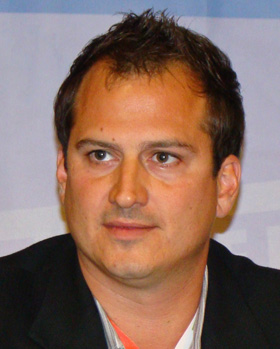|
When he is not engaged in the
business of domains, Latona is busy writing about it in a blog at RickLatona.com.
You might say he is the Tasmanian
Devil of the domain industry - a whirling dervish
who seems bent on devouring everything in his path. While
Latona is a very personable guy he wears ambition on his
sleeve. Latona told me, "People that work for me often
hear me say, “This ain't no social event”. It's a
phrase I learned from my father. I'm not here to make friends.
This is serious business and I expect nothing less than
the best and to be the greatest. Going big is
the only way to go. I'm a failure if we finish in
second place."Latona's
take no
prisoners attitude can be traced all the way back to his
childhood. His story begins in New York City where he
was born in 1972. His mother, whose maiden name was Linda
Faye Grayson, was an educated woman (the daughter of a
career Marine) who devoted her working life to the Girls
Scouts of the USA. His dad, Richard, was
Linda Faye's opposite in many ways. The New York Sicilian had
dropped out of school and was working as a funeral director
when he met Linda Faye. "I'm not sure what they had in
common when they met - but I'm glad they did!" Latona
said. Richard would end up finding a new business calling and
having an enormous impact on what his son Rick would decide to
do with his life. 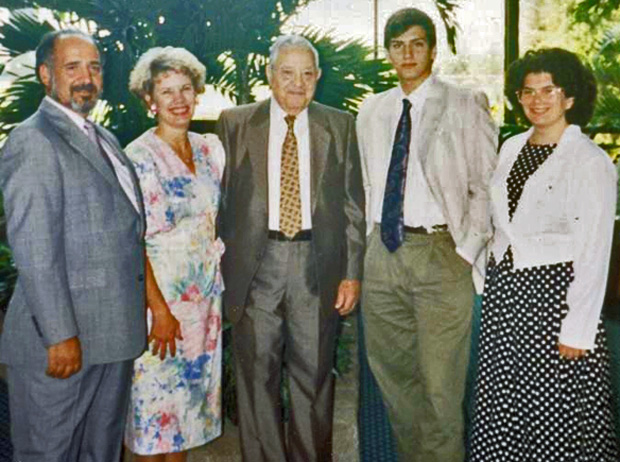
1988
Family photo (left to right): Rick's father Richard,
mother Linda Faye,
paternal grandfather Lawrence, a 16-year-old Rick
Latona and sister Dee-Ann.
|
"When I was
around 8 years old we moved to Florida," Latona
said. "The plan was to stop when one of my parents found
a job. My mother got a job first at the Heart of Florida
Girl Scout Council in Lakeland so that's where we
set up shop. My father eventually found work at Lakeland
Ford, a car dealership where he proceeded to kick butt
as the top salesman month after month, year after year. I
basically grew up in the car business. He went on to
open small car lots and held various management positions at
dealership after dealership. He was extremely good at his job
and I idolized him for his sales abilities."
"I
knew from the beginning that I wanted to be a businessman.
For instance, my earliest memory of my father was when he came
home one day, really excited and told my mother he sold six
cars. I was so happy for him and thought about it often,"
Latona recalled.
Though
Latona knew what he wanted from a very early age it
took a long time to figure out exactly how he to get
it. "I don't remember ever not expecting a lot of
myself," Latona said, "but this quality was both a
driving force
|
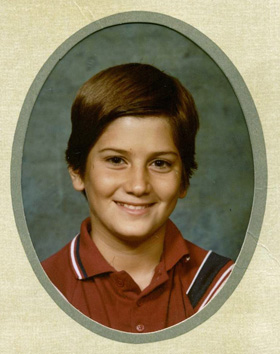
Latona
at age 11 - 1983 school photo
from Lakeland's St. Paul Lutheran School |
| and a curse. I was more than a little too
full of myself, cocky and conceited. That's probably why
I'm still a little cocky and conceited today. Old habits
are hard to break! Please don't take that to mean
that I have always been driven though. In fact, the
opposite is true. I was full of myself in my own head but did
little to accomplish anything." |
|
|
"I
don't remember ever doing my homework. I thought my teachers
weren't smart enough and fought them every step of the
way. I changed schools many times as my mother tried to find a
system that would fit me. In the end, I quit school on
my 16th birthday, the day I was legally allowed to
quit. I still remember my friends telling me that I would end
up pumping gas for a living. That never happened, but
that may be because people don't pump gas for you in the
States anymore except in very remote places!" Latona
laughed.
"My
early adult years were trying though. I found myself
uneducated but with high-hopes for myself. I partied a little too
hard when I was younger. Almost any picture I could find
of myself I had a cigarette in my mouth and a mullet in the
back of my head. I lacked focus and continued with the
same bad behaviors that had dictated my life up until that
point," Latona said.
A
turning point finally came when he was 19 and still found
himself to be "basically a screw-off." "I was
having one of my moments where I was talking about how I
would be someone one day and one of my friends said,
“Rick, you always say that but here you are sitting
on my couch”. I looked up at him, went silent, stood up
and walked out."
|

Rick
Latona at 18 |
"I
was sincerely determined to not just talk about
being someone but do something about it. I needed help
though and didn't know where to start. I went to a book store
and purchased The
Psychology of Winning by Dr. Denis Waitley.
The book, originally written for professional athletes,
basically has this tone - winners do this, losers do that,
winners do this, losers do that, winners do this, losers do
that..."
"The
book had a profound impact on me," Latona
continued. "After reading it I started consuming other
books, one after another. I became obsessed. I stopped
listening to music because I could listen to books in the car.
I wanted to read as many as I could get my hands on. Over the
next years I went from being completely uneducated to
what must have been an equivalent of an MBA degree. In
a five year period I consumed more than 1,000 books,
all related to history, sales, management, negotiation or
other useful subjects. I also taught myself Spanish."
|
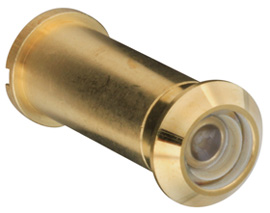
Latona
started his business
career selling everything from
peepholes to Christmas trees!

|
"During
that time when I was reading everything I could get my hands
on, a fire was lit in me," Latona said. "I
started working hard but again, I didn't really know where to
start. The first business I came up with was door-to-door peephole
sales. I had the idea while selling coupon books for a
company, one of the only jobs I ever had working for someone
else. I used to stand in front of the doors thinking about the
perfect facial expression to have when they opened the door.
Naturally, I would think about whether they were looking at me
through a peephole. I figured that everyone who didn't have a
peephole wanted one so I bought a drill, half inch bit,
extension cord and a box of peepholes! I paid $1 per
unit at the time and sold them for $20 each. I thought
I was rich when I sold five of them the first day but I
cracked someone's door on the second day and had to shut down
the business!" Latona smiled.
"The
next thing I got into was a christmas tree lot. Man
that was hard work. I bought 250 trees from a
wholesaler, rented a building and carried all 250 trees in and
out of that building every day; progressively less
trees each day of course. It was very fulfilling work. I miss the
smell more than anything. Opening the door of that
building in the morning with a couple hundred trees in it was
a smell that one could never forget. I can tell you everything
you'd never want to know about Fraser Firs, Douglas
Firs, Nobles and Pines."
"The
next business I tried was the first one to really
take off for me. Yard sales! Seriously. It started
when my parents let me sell the junk in their garage that they
would never want again. I sat outside all weekend and made $600.
That was so much money to me at the time!," Latona recallrd
fondly. "I told myself, why not do it every weekend? I
had one problem though, inventory. It was then that I
first believed in myself that I could buy things
cheaper than other people could. Then through sheer effort |
| and
honing my skills that I could sell the stuff for a profit. In
other words, I realized that when dealing with flipping
pre-owned inventory, the money is made when you buy it right.
It'll sell for whatever it is going to sell for. This core
theory runs my domain enterprise to this very day,"
Latona said.
|
"I
bought a junky old Chevy cargo van and went to work.
I got up at 3am every morning, went to the newspaper
distribution center to get that day's first copy, scanned it
for yard sales, mapped out a route based on their published
starting times and showed up to the first one 2 hours early.
I would bang on their doors and when they answered I would
say, let me see what is in your garage. Maybe I'll give you $100
for everything, you can forget about sitting outside all day
and take your wife to the beach instead. Many people went for
it. I started buying 3-5 van loads worth of stuff every
day!"
|
"Three
months into the operation I had two employees. a warehouse and
a retail strategy. We would rent a different house every
weekend to sell the previous weekend's booty. We'd load up
every room in the house and make it look like a family had
been there for 40 years and was just selling all their
accumulated junk. We'd place ads in all the papers saying
“Divorce, Moving, Estate Sale – every thing
must go” and
put up signs on every corner for a 5 mile radius."
|
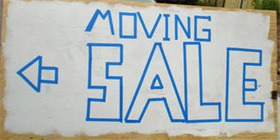
|
|
"When
Saturday morning would come we'd have customers lined up
down the street as far as you could see. I would tell them
the sale would start at 8 am (no early birds) and we'd wait
until 8:30 am. I'd come outside and say “Listen everyone,
you can't pick anything up unless you are going to buy it.
We will not negotiate for the first 3 hours. First person to
pick up the item buys it." Our average sales by noon each
Saturday was in excess of $5,000. It was an
enterprise," Latona said. |
|
"Six
months into it I had a 10,000 square foot warehouse packed
with $10,000 in inventory. Something was wrong with
that math. Next door to my storage facilities there was a pawn
shop. The owner wouldn't open the doors until noon and
every day when he opened he would have a line of people
waiting to do business with him. I realized that he had the
same $10,000 in inventory in a single showcase and
never risked a back injury trying to sell a gold necklace."
"So,
I
bought a pawn license and started Cash Depot, Inc.
Three years later I sold that business for $250,000. It
all started with that $600 made at that first yard
sale," Latona noted. "While in the pawn business I
was buying something, selling something or loaning money to
someone every 20 minutes. I will always consider that the best
negotiating training one could ever have."
|

|
While
Latona had now become the businessman he had always envisioned
being, he still had another giant leap to make - from
brick and mortar to the Internet. We asked him how that came
about.
"In
the mid-90s, two things happened which opened my eyes to the
potential of the Internet business," Latona
recalled. "The first was Dell Computers announcing
that they did $1 million in sales in one day on
the net. The second would have been Netscape's initial
public offering in 1995. Their stock price was set at $28
but was at $75 by the end of the first day of trading.
I remember clearly reading about it in the Wall Street
Journal and I bought a computer the next day,
downloaded Netscape and didn't leave the spot for some time. I
spent the next month or so reading white papers published by
major tech companies and immersed myself in the
technologies at play."
"Around
that same time, my family used to operate a company called Telemedia
Technologies which was essentially a lead generation
business for car dealerships like 800-Car-Loan where
people could call and apply for a loan with their touch-tone
phone, regardless of their past credit history. Like Rick
Schwartz and National A-1 I recognized the value
of domains through their vanity purpose immediately
because of my experience in computer telephone and interactive
voice response."
| Latona
also credits his sister Dee-Ann for his early discovery
of what the web had to offer, though he now wishes he had not
listened to everything she had to say. "She's the
real reason I got in the technology business and while I blame
not being bigger in domains than I am on her, I wouldn't have
been in the internet business at all without her. She
met her husband over the internet in the 1980s. Yes, you read
that right. In the 1980s. I'm talking about way before Tim
Berners-Lee came up with the hyper-text concept and markup
language (html)," Latona said.
"While
at Penn State Dee-Ann hung out in IRC chat
rooms, used GOPHER and other now
antiquated technologies. Before then, when we were kids in the
same house, she was always typing away on her Commodore computer
writing a novel at 16 while I was sneaking out of the
house. Her husband worked on the Linux core with Linus
Torvold. They are the real deal, seriously
old-school internet pros that are experts in Open Source
technologies. My sister has written dozens of books on
Linux and speaks at their conventions. Her blog can be found
at http://www.dee-annleblanc.com/."
|
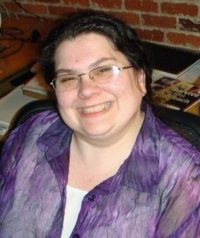
Author
Dee-Ann Leblanc
(Rick's sister) |
"In
1995 I had the brilliant idea to register a crap load of
domains to sell later on. My sister chastised me and
told me not to do it. She told me that companies like Johnson
and Johnson who registered a lot of domains were thought
of like cyber squatters and people wouldn't respect me if I
did it. She was very passionate about it and I didn't
know any better so I listened to her. This is the same girl
that told me not to put advertising on websites because it
makes them cluttered. I listened to her!," Latona
said ruefully.
"Don't
get me wrong - I have nothing but mad respect for my
sister, but oh the regrets! We've all heard people talk about
if they only knew then what they knew now. The problem is that
I knew then. I had the beat on all of the biggest
domainers but didn't act. It's because of this that
when I had the chance again, I acted with such a vengeance
so I could force my way into the big-time."
|
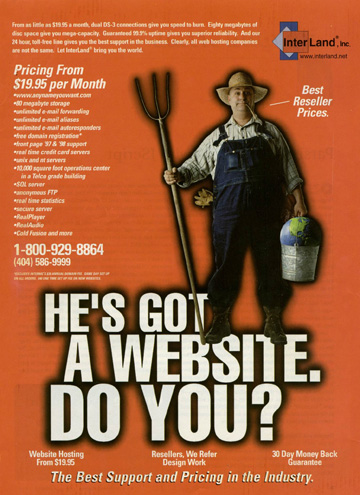
|
Latona
continued, "In 1997 I decided that I was going to become
a famous internet business person or die trying. I
packed my bags and left Florida for the Silicon Valley.
The problem is that I never made it that far. I stopped
in Atlanta to visit some friends and one of them
introduced me to the guys that were starting Interland,
a hosting company for small and medium businesses. I
interviewed with them and was brought on as one of the first
people, then director of sales, then VP of Sales and later I
was issued founder's shares."
"Your old school readers will probably remember
the Interland magazine ad (at left) because it was plastered on the back
cover of every internet related magazine in the 90s.
The farmer was clip art and we photoshopped in the earth in his
bucket," Latona said. "The funny thing about that ad
is people used to call us and tell us, I don't have a
website and I want one, what do I do? We would have to tell them, let
us register a domain for you first, then we'll setup hosting
and recommend web designers for you.
|
| It was then that I
realized that getting a domain was the first thing
people had to do in order to get set up."
|
"Everyone
was starting hosting companies back then but while I was
leading the sales department, Ken Gavronovic, the CEO,
told me if I increased sales by at least 15% over the
previous month, he would give me 1% of the sales total
and never cut my pay. As soon as I increased sales by
less than 15%, we would renegotiate my pay. I NEVER missed
my goal. The first month we did $30,000 in new
business. Two years later we did $3.5 million in new
business in one month. The board eventually moved me to Amsterdam
to run European operations. They had told me that
they could no longer keep paying me 1%, I told them that if
they tried to cut me I'd leave, or they could give me
Europe. I got Europe."
"It
was at Interland that I became an “infrastructure guy”.
Meaning, while helping run a hosting company, I realized that
it is better to sell pick axes during a gold rush
than look for the gold. The Interland experience is
directly related to Latona's
Domain Brokerage and Auction House."
"By
the year 2000 the hosting business was dominated by two
companies. The biggest was Verio, a roll-up - meaning a
company that was big because they bought lots of other smaller
companies. The second biggest was Interland, with over 600,000
customers and we got each and every one of them the hard
way, organically. We advertised a lot and I had a vicious
sales department under me that closed deals at a very high
percentage," Latona said.
| Latona
should have been set - but another thing he learned is
that there are no certainties in life. "Verio sold
to NTT Telecom for around $5 billion," he
said. "At Interland we turned down offers and eventually went
public right while the Internet bubble was bursting
and finally, by the time my founder's shares lock up expired,
my stock was worth very little. We did everything right
at that company to go public but never once talked about who
we were going to be after we went public. After a
series of unfortunate events, the party was over and it was
time to leave."
Latona
recalled one major domain related event that happened during
his Interland years. "I took a trip to Singapore
in 1999 for the very first ICANN meeting where
they talked about breaking up the Network Solutions
monopoly. Interland at the time was registering 70,000
domains a day for our customers (from NetSol) at $70
per domain and making nothing on it!"
|

|
When
Latona left Interland after the IPO in early 2001 he wasn't
sure what he was going to do next. A chance meeting wound up
determining that. "While analyzing opportunities, I ran
into Marc Womack who used to work with me at Interland,"
Latona said. "He had started a site called Consumption
Junction in 1999 which had really taken off. The Alexa ranking
on the site at the time was somewhere around 400. CJ
was a shock site with sexual and violent content. I'm
not particularly proud of Consumption Junction but it has to
be talked about because it is part my story."
|

|
"The
biggest business mistake I ever made was my handling of that
company. Someone once said that if the railroad companies
realized that they were in the transportation business and not
the real estate business, we'd all be flying Union Pacific
Airways. At Consumption Junction we were an entertainment
company and a video distribution company. At its core, it was
YouTube years before YouTube.com came out. It
should have been me selling the company for a billion dollars.
Instead, |
| YouTube.com came out and quickly ate away at our
market share until we eventually sold the domain for scraps,"
Latona said.
|
"I
focused too much on the entertainment aspect of the company
and not enough on the video distribution part of it. I should
have launched a family friendly version using our platform and
traffic base. Another mistake made. What was supposed to be me
working as a consultant for Marc, helping him with Consumption
Junction, turned into it being all I worked on for the next
three years or so. In some ways, I consider that time the least
productive years of my life."
As it would happen, that fallow period for Latona would soon
be replaced by a run that has been remarkably productive over
the past five years. He was about to take another turn - one
that would lead him to a position of prominence in the domain
industry.
|
Latona
set the stage by noting,"I had picked up a few choice
premium domains in 1997. The first of which was Spanish.com,
which I paid $5,000 for. I was trying to learn Spanish
at the time and I thought it was an interesting business
because you could create the learning program once and then
sell it over and over again. That same year I bought
Portuguese.com from Larry Fischer. Of all the
people I know in the domain business, I started talking to him
first. I ran into Rick Schwartz two years later at an
unrelated convention in 1999."
"I
started getting serious about the domain industry in 2004.
I listed Spanish.com for sale on Rick Schwartz's message board
and Kevin Ham bought it from me for
well into six figures. I
can honestly tell you that in 2004, I still didn't know
what domain parking was. I typed in the domain after
Kevin bought it and saw the HitFarm page he pointed it
to - that's when things started to click!" Latona
said.
"That's
when I launched DigiPawn.com. I actually started it with the
same money that Kevin paid me for Spanish.com. Regardless of
|
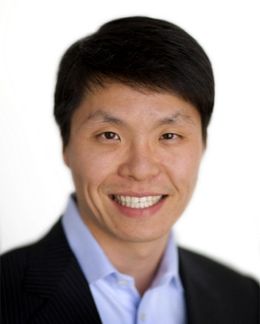
Dr.
Kevin Ham - his 6-figure purchase
of Spanish.com gave Rick Latona the
capital he needed to make a big
splash in the domain industry. |
| what some other competitors might say, I was the first
to loan money on domain names. Later on that same year I went
to the first
T.R.A.F.F.I.C. event in Delray Beach and I
was officially in the domain business."
|
"When
I started DigiPawn it was really about earning interest.
I didn't know much at all about the domain business at the
time. I was constantly calling people trying to figure out
what to pay for names or how much I could sell them for. I
sold names like Yo.com for $70,000 because I
didn't know any better," Latona said.
"Even
with DigiPawn fully up and running, domains were still only a part
time effort for me. If you can believe this, it wasn't until
2007 that I went full-time on domains and started
focusing every waking minute. That's when Ryan Steel
and Toby Clements started working with me. Ryan would
develop the names and Toby would help me buy the names. With
Toby as my partner we hired a dozen full-time buyers we called
Bounty Hunters and started hitting up everyone in the
world that owned premium domains trying to buy them as cheap
as we could to flip for a profit."
|
"We
bought a lot of domains. I'm not sure that anyone
bought and sold as many names as we did in 2008. That's got to
be the reason my peers voted me Domainer of the Year
that year. In February 2008 I started the Daily Domains
newsletter as an outlet to move the inventory. We were trying
to sell the names as fast as we could so we could get the
capital back and invest in other names."
"I
hadn't intended on getting into the auction business but I was
always begging Moniker for a lot of slots in their
auctions and not always getting them. I felt it wasn't fair
because I knew I was bringing a lot of fresh inventory to the
table that was priced to sell. When Rick Schwartz announced
that he was going to allow multiple auction companies
at the T.R.A.F.F.I.C. events we saw our chance and jumped
on it."
"My
company is a lot more like Interland these days. I am now in
the domain infrastructure business. My goal is to
provide capital for domainers and help them sell their assets
for as much as they can. None of what we were doing in 2008
applies now. Those days of bounty hunting are over. My team
and I picked most of the low hanging fruit, although
there is still some fruit on those trees. What started as a way for
me to sell names, turned into a method for me to sell names
for other people." |
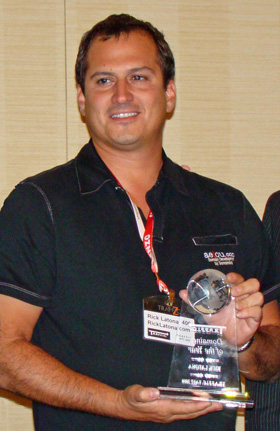
Latona
with the Domainer of the Year
Award he received in 2008 |
Latona
may have entered his current business almost by accident - but
that doesn't mean he isn't totally dedicated to being
the top dog in it now that he is here. "Business
is war," Latona said. "It isn't just about
marketing and sales. You need a battle plan. How are you going
to flank your enemy? What's your surprise attack? These
are the questions I ask myself. I've read far too many history
books and business case studies to look at it any other
way."
"I
realized immediately that the trade shows were the
distribution platform for the auctions. Cutting a deal
with Rick and Howard would be like Pepsi eliminating Coca-Cola's
ability to deliver the drinks to the stores and restaurants.
It was an expensive and risky move but I'm confident
it'll go down in history as one of the best tactics I've put
into effect."
|

|
"When
all is said and done, Latona's Domain Brokerage and Auction
House will be a complete consolidation of my domain
related enterprises and will likely expand into other forms of
intellectual property, be it copyrights, patents or what-not.
We've gone through great effort to showcase domains like the priceless
assets they are on Latona's. We even do original works of
art to represent each name." |
"I
have five full-time, very expensive Java programmers
building enterprise class software to run the system and I
promise to never cut back, only to add to the
programming resources. Latona's will be an ongoing effort with
continually compounding technology which will become the
center for trading domains. I can't give away too much of
my plan now but everyone should just watch and pay close
attention. It's going to get interesting," Latona
promised.
It
will also be interesting to see how Latona handles his new
stewardship of all but one of the 2010 T.R.A.F.F.I.C.
conferences (show Co-Founders Rick Schwartz and Howard Neu
will run an October event on Miami's South Beach).
Latona showed he was up to the task with the highly
professional Amsterdam conference
he staged this past June under a licensing agreement that
later led to a full blown partnership with Schwartz and Neu.
Now that he has a greater say in all T.R.A.F.F.I.C. matters
people are wondering how much the show's successful formula
might be changed.
"Rick
and Howard have done an excellent job but they needed someone
with my energy to take it to the next level," Latona
said. " I need the trade
shows as a platform for everything else I'm trying to do for
this industry."
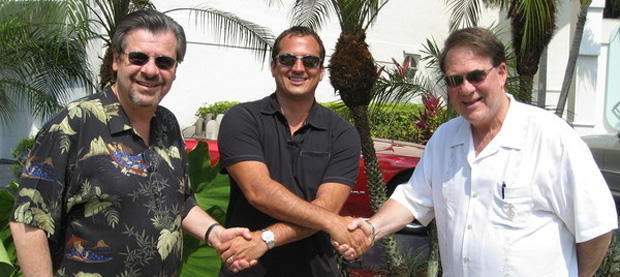
T.R.A.F.F.I.C.
partners Rick Schwartz, Rick Latona and
Howard Neu
"While
I was in Australia for the T.R.A.F.F.I.C.
event that Fabulous threw, I met many people that wouldn't normally go to the
shows. That's when I realized that you have to go global to
get local. We tested the theory by throwing a single event in
Amsterdam, met another 100 people I wouldn't have normally met
and I was hooked. It's about getting my own company and my sponsors in front of a large
crowd on a global scale, even if it takes going to six locations
per year."
"T.R.A.F.F.I.C.
is now all about touching as many domainers as possible,"
Latona continued. "Rick and Howard
have done a great job and have adapted and changed the show as
the industry needed the show to change so I'm
not going to wholesale change T.R.A.F.F.I.C. shows - I'm just going to
continue on the same lines."
"The
show is first and foremost about networking. We will continue
to add and improve on the networking events as well as always
look for ways to have more intellectually stimulating
seminars.
The
newest event at the show and the most exciting thing happening
right now is actually something that was Howard Neu's idea.
It's the Test Track events, modeled after ABC's TV show
Shark Tank."
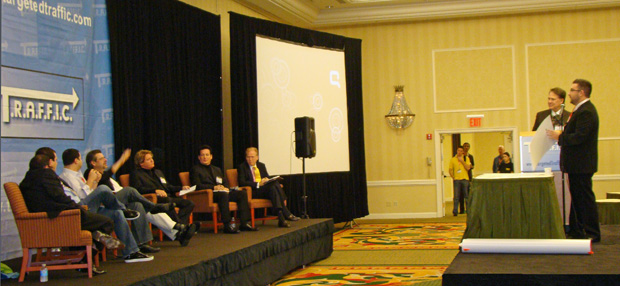
In
the photo above, Test Track makes its debut at T.R.A.F.F.I.C.
New York in October 2009.
Latona plans to build this feature into a headline event at
future T.R.A.F.F.I.C. conferences.
"At
Test Track, entrepreneurs pitch their idea to a panel of
investors. The people that I will have on the panel are
legitimate early stage venture capitalists and angel
investors. This is much more than a "festival of pitches". This is real business
being done - people asking for investment from real investors.
Like the auction business, it'll
grow over time and become increasingly important in our space.
It's a mission of mine at this point."
|
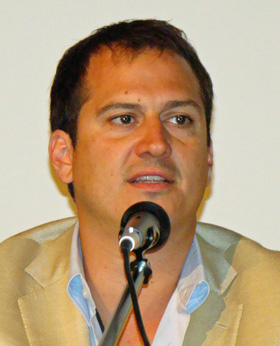
Latona
speaking at the
T.R.A.F.F.I.C. ccTLDs show he
produced in Amsterdam in June 2009 |
Latona
has obviously accomplished a lot over the past couple of
years. He has risen so quickly that many of his bigger
competitors may not have noticed him gaining ground in their
rear view mirrors. He is no longer a secret though so
the game could get a lot tougher in the trenches going
forward. None the less, Latona is undaunted. "You
remember my Interland story? This isn't the first time I've
competed against VC backed conglomerates," Latona pointed
out. " My company is 100%
organic and I plan to keep it that way as long as possible. We
have no immediate plans to acquire any companies either.
After
15 years in the Internet business I can confidently tell you
that any company can rise to the top in months and any company
can fall from grace in months. I've been on both sides of that
story more times than I care to remember."
"What's
important is to have a good reputation, a fantastic team
behind you and a brilliant strategy you can execute on.
That's
what's great about the Internet industry. When you can build a
company as quick as we have, why would you want to be in any
other business?
Still, our work
is far from done. We
really have just gotten started!
|
|






